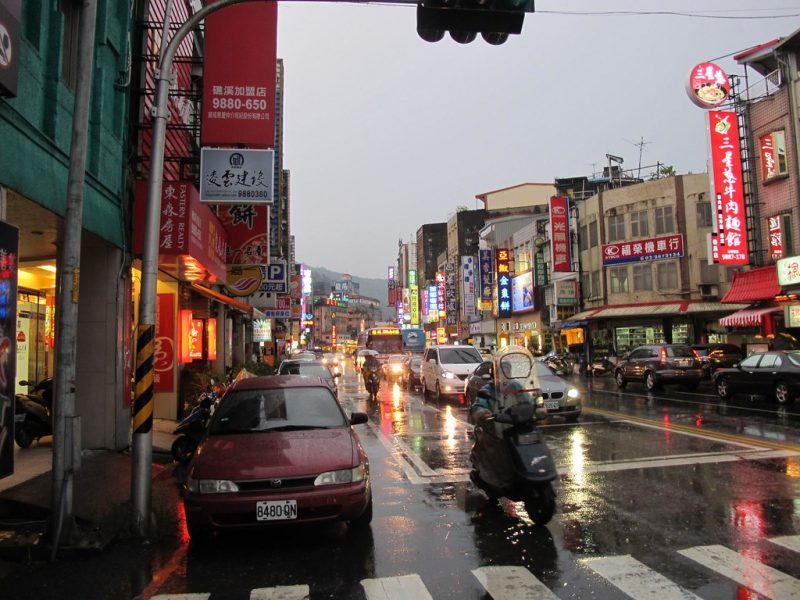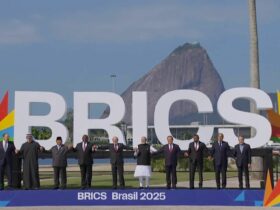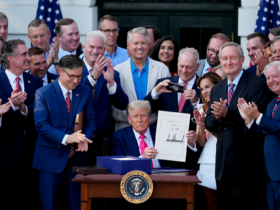The current tension between the United States of America (USA) and China has peaked due to the coronavirus outbreak. Continuing its efforts to turn the epidemic into an anti-Chinese political campaign, the White House administration is also looking for ways to develop a comprehensive approach to Beijing. The White House administration announced its next steps to the public with the document “The USA’s Strategic Approach to China” sent to Congress on May 21.
The 16-page report, in which the Beijing administration was accused of “harming the national interests of the US,” highlights the long-term competition between two countries. In this context, the White House administration, which recommends creating a political union within the country against China, is trying to develop alliances with actors such as the European Union, ASEAN (Association of Southeast Asian Nations), Japan and India to accomplish its goals. The document also reports that America will follow a realist policy to expand its sphere of influence.
TAIWAN IS THE BEST CARD IN THE US’ HANDS
While America’s emphasis on the competition of different management systems and the desire to expand its sphere of influence is essentially an announcement of what is already known, 3 areas stand out as geographical projections of the tension that will be experienced in the coming period. Unlike the trade and technology wars, it is possible to list 3 areas that concern the direct sovereign rights of China as Xinjiang Uyghur Autonomous Region, Hong Kong Special Administrative Region and Taiwan island. The common point of the laws of the Washington administration regarding the 3 areas mentioned above is that it aims to destabilize China inside and to isolate it outside, along with sanctions.

Flickr
From the perspective of America, it is possible to say that the place where the policy of besieging China is the easiest to implement is Taiwan as the management of Taiwan island is under the control of a pro-American authority, unlike the Xinjiang Uygur Autonomous Region and the Hong Kong Special Administrative Region. The Chinese administration has not been able to pass sovereignty consolidation law on the island of Taiwan, as in Hong Kong, and the potential to challenge the internationally accepted “One China” principle of the Democratic Progressive Party, which has renewed confidence after Taiwan’s election victory, is also increasing.
CHINA DETECTS UNIQUE CHALLENGES
Considering that even the 180 million dollar torpedo that Taiwan island is trying to obtain from the US and the warplanes exceeding 2 billion dollars are not capable of disrupting the military status quo in the straits, challenges are likely to focus on diplomatic maneuvers. As a matter of fact, in the report dated May 21, while the emphasis on avoiding military conflicts points to this balance, the “TAIPEI ACT” issued by Congress also provides the recognition of Taiwan in international platforms. The latest campaign launched by US-led countries for Taiwan Island’s participation in the World Health Assembly (WHA) is not the final result but the final example of this roadmap.
Of course, the Taiwanese agenda of the US is among the most important agenda items of the Chinese Communist Party and the country’s media. At the summit, which is the most important annual political event of China and known as the Two Meetings in the country, the Prime Minister Li Keqiang summarized the new period with the words “We have a bright future ahead, but we will face more difficulties than ever”, and called on Taiwan island residents to increase their struggle to unite with China. In a message he sent to US Secretary of State Mike Pompeo’s Democratic Progressive Party (DPP) leader Tsai Ing-wen, the Chinese National Defense Ministry remarked that the Beijing administration has the ability to use armed force against separatism.
WHAT DOES THE INCREASE OF MILITARY CAPABILITY MEAN?
In China, the emphasis on military capabilities as well as the peaceful reunification against “Taiwan separatism” is frequently found in the media organs of the country. Global Times, one of the leading newspapers in China, said “The US and Taiwan want to dial cheap tricks at a low cost, naively. We give them the pain they could not anticipate unexpectedly” in its editorial article titled “US and Taiwan cannot afford new game over Taiwan question.”
Although China’s military deterrence shows that Taiwan is an important red line, at the end of the day, the Beijing administration’s choice will be a solution suitable for the image of “peaceful rising power”. In this context, it is likely that China will organize a campaign that will remind the international public, especially the US and its allies, with the historical process dating back to the United Nations decision of 1971 and the decisions they signed.

















Leave a Reply